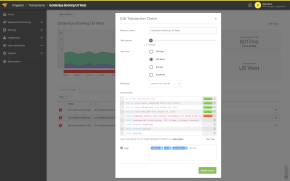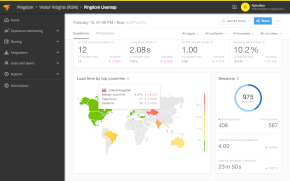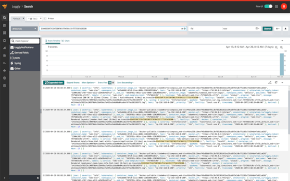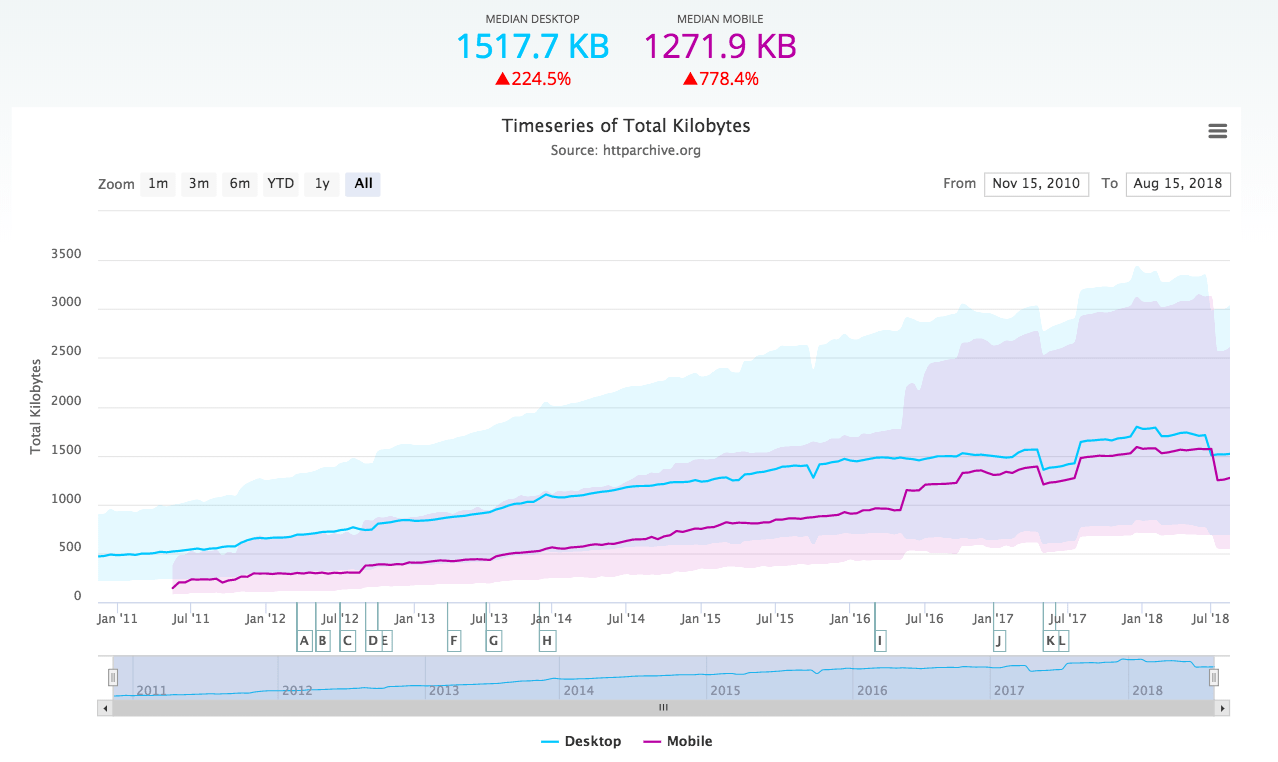
There’s no doubt that Facebook is the dominant player on the social networking scene, but just how dominating is it? We know that there are many other social networks, including the well-known LinkedIn, Twitter, and others. How do they compare with Facebook in terms of traffic, that’s the question.
Last year we published a study of social networks with more than 1 million visitors per day. Then we could spot 29 websites that made the list. This time, it’s down to 26. It seems like Facebook keeps growing and many other sites find it harder to keep users.
Number of daily unique visitors
We based our study on numbers from Google Trends for Websites and identified all the social networks with more than 1 million daily unique visitors. The study started off with this list of social networks and branched out with additional sites. We studied around 150 different sites in all for potential inclusion in the list. Summarized in the chart below, we found 26 sites with more than 1 million daily unique visitors.
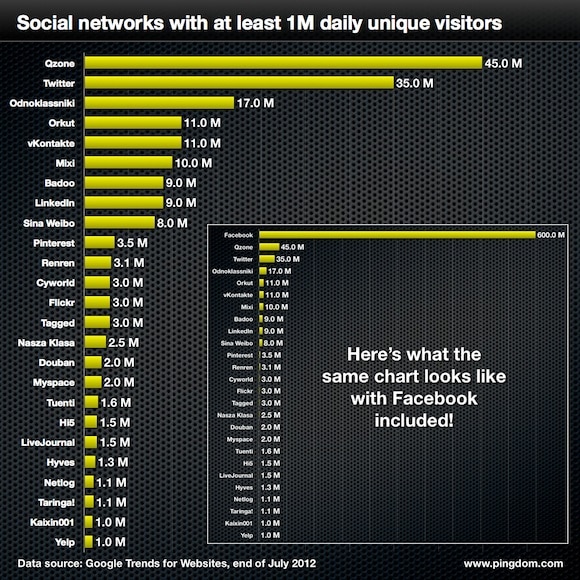
A larger version of the chart is available here.
It’s worth pointing out that we decided to make the chart without Facebook, simply because its dominance makes the chart much less meaningful for all the other sites. We should also mention that the traffic numbers are estimates by Google derived from various sources. That said, we think the numbers will at least give a solid indication as to how things are developing.
Before we present the data for each individual site, let’s make a few observations first:
- There were 29 sites on the list in March 2011, now there are only 26.
- 6 sites disappeared from the list: DeviantART, iWiW, Meinvz, Skyrock, Sonic, and Wer-kennt-wen.
- 3 sites were added to the list: Pinterest, Sina Weibo, and Yelp.
- Facebook’s domination is crushing. Even when we add up the visitor numbers for all the other 25 sites, that amounts to less than a third of Facebook’s traffic.
- In both absolute, as well as relative terms, Facebook grew the most out of all sites in our last study. From 310 million to 600 million daily unique users, which is a 94% increase.
- In second place came Odnoklassniki, which grew 83%.
- Among the sites that lost traffic, Orkut fared the worse with a drop of 78%.
- One especially notable site that lost traffic was Myspace, which dropped half of its traffic, from 4 million to 2 million daily unique users.
Let’s go through all the sites
Now we can go through all the sites, 26 in all. We present them in order of daily unique visitors, starting, of course, with Facebook. You will see that there is an interesting mix of sites gaining traffic, sites losing traffic, and sites in between.
Note that this is just web traffic and does not include any usage through mobile apps.
There seems to be no stopping the Facebook juggernaut. With close to 600 million daily unique visitors (and 901 million monthly active users), Zuckerberg’s machine keeps on going. If the site keeps the same level of growth by this time next year, it will surely have passed 1 billion daily unique users.

Qzone
Qzone remains China’s largest social network. It’s obviously far behind Facebook, but presumably Qzone stands a better chance of capitalizing on the growing user base in China than its competitors.

With around 35 million daily unique visitors, Twitter is obviously one of the bigger players in the social networking business. Over the past year, Twitter has seen a decent increase in traffic.

Odnoklassniki
Odnoklassniki, or “classmates” in Russian, claims that it has 45 million registered users and 10 million visitors per day. That last figure fits fairly well with that from Google Trends.

Orkut
Orkut has dropped from around 51 million in our previous study to around 11 million daily unique users now. That means Orkut was the biggest relative loser of traffic.

vKontakte
Popular in Russia and other parts of the former Soviet Union, VK (or vKontakte, if you like) currently gets around 11 million daily unique visitors.

Mixi
As the biggest social network in Japan, Mixi’s traffic saw a significant jump in 2011 and now holds pretty steady above 10 million daily unique users.

Badoo
Badoo claims more than 156 million registered users in 180 countries. It’s most active in Latin America and Southern Europe, but has recently made a push into the US, where it attracted 8 million users in the first two months.

Professional social network LinkedIn hasn’t changed much in traffic over the past year, landing now at around 9 million daily unique visitors.

Sina Weibo
The Chinese Sina Weibo social network, a hybrid between Twitter and Facebook, has just below 8 million daily unique visitors.

Pinterest wasn’t a part of our article from last year, and to most users it seemed to come out of nowhere to become a hit very fast. Currently at around 3.5 million daily unique visitors, Pinterest’s growth spurt seems to have stalled a bit over recent months.

Renren
Having been called “China’s Facebook” may not be an altogether bad thing, as traffic at Renren is slightly higher today than it did a year ago.

Cyworld
South Korea’s Cyworld has tried to branch out to Europe and the US but failed. Now it concentrates on its home market as well as China and Vietnam. Apparently, selling its virtual currency dotori, which can be used to pay for virtual goods in the social network, makes most of its revenue.

Flickr
It remains to be seen whether new Yahoo CEO Marissa Mayer can save Flickr, as so many users hopes she will. From around 5 million daily unique visitors in 2009, Flickr now stands at around 3 million.

Tagged
Although it’s been called “the world’s most annoying website,” Tagged must be doing something right. Traffic is holding steady at around 3 million daily unique visitors.

Nasza-Klasa
Nasza Klasa, or now NK for short, is a social network focused on Poland. Like most other country-focused social networks, its traffic has been in steady decline.

Douban
Douban is another Chinese social network. Its traffic has gone through a rollercoaster ride in recent years, and now stands at around 2 million daily unique visitors.

Myspace
You can’t help but feel a bit sad for Myspace, now with only 2 million unique visitors per day. That’s a fall from a high of around 25-30 million in 2009.

Tuenti
Starting out as the “Spanish Facebook” Tuenti recently opened up to users from anywhere around the world. The social network also seems to focus on mobile social networking, through apps and mobile versions of its sites.

Hi5
Today, Hi5 is classified as a social gaming site, although that’s not immediately noticeable when you visit the site. But whatever kind of site it now is, Hi5 has seen a dramatic decline in traffic from around 8 million daily unique visitors in early 2010 to today’s around 1.5 million.

LiveJournal
LiveJournal has changed owners and base of operations a few times since its inception in 1999, and it’s now headquartered in Russia.

Hyves
For a social network focused on the Netherlands (with a population of almost 17 million), Hyves has managed to reach some pretty impressive statistics. That said, its traffic has seen a steady decline since the end of last year.

Netlog
Belgium-based Netlog is localized in a wide range of languages and is especially popular across Europe.

Taringa!
In our previous study, the trend in terms of traffic was a positive one for the Argentinian social network Taringa. Now, the number of daily unique users seems to be steadily dropping.

Kaixin001
With traffic right around 1 million daily unique users, Kaixin001, another Chinese social network, was under threat not to make it onto the list, but it just barely manages to hang on.

Yelp
Yelp claims that the sites had an average of around 71 million monthly unique users in the first quarter of 2012. That doesn’t match with the recent figures, which shows the site teetering on the 1 million daily unique visitors mark. It actually looks like Yelp is now below the 1 million mark, but it’s with such a small margin that we decided to include the site anyway.

What about Google+?
Since we can’t get the statistics of Google+ through the same way we have all the other sites (it doesn’t show up in Google Trends for Websites), we decided not to include it. However, it would rank among the top social networks, for sure. At Google I/O at the end of June, Google announced that Google+ has 75 million daily active users.
Special mentions
These sites wouldn’t really be classified as social networks, although both clearly contain large elements of social interaction. But we felt they deserved a mention, at the very least, as chances are you already hang out on one or more of them.
Github
On Github, 1,865,146 people collaborate across 3,319,199 repositories. It’s become the go-to place to store code for developers and others across the world. Earlier this month it received a $100 million investment, so perhaps Github’s new motto will be “all your code are belong to us.”

Some have argued that Reddit was one main factor behind the decline of Digg.com. Whether that’s true or not, it seems that Reddit is attracting more and more users, with daily unique visitors numbers heading in a positive direction.

Slashdot
Slashdot’s traffic has fallen over recent years but appears to have stabilized recently.

Stack Overflow
Stack Overflow would qualify for a position in our list if we go by traffic alone.

Which sites will be around next year?
Besides Facebook’s crushing domination, one thing that is clear is that the country-focused sites, with a few exceptions, have been bleeding traffic over the last few years. Arguably, Facebook’s domination is a big factor in that, but it could also be a general trend where users shun online services focused on local and regional areas in favor of international ones.
We’ll leave you to ponder what sites will be around if we do this article again next year? Will any newcomer have the power to break through? Who do you tip for falling off or making it onto the list?
Sources: Wikipedia and Google Trends for Websites.
Image (top) via Shutterstock.
